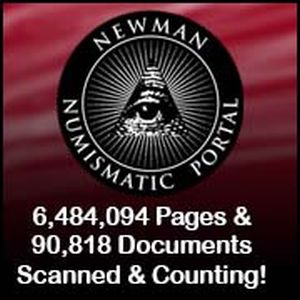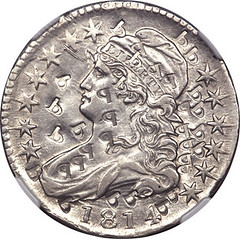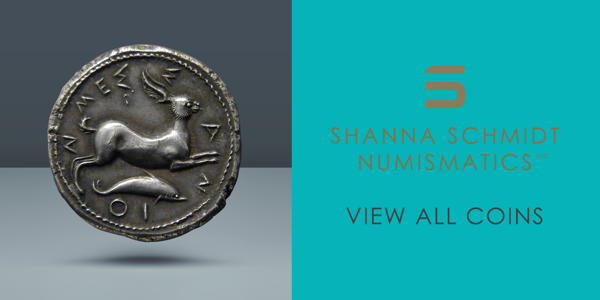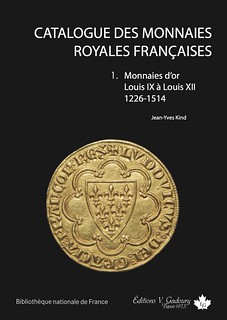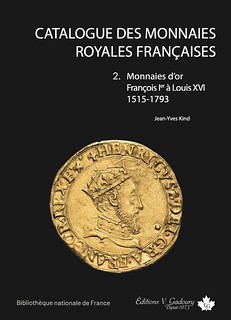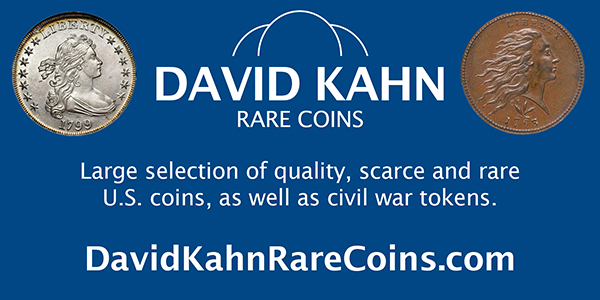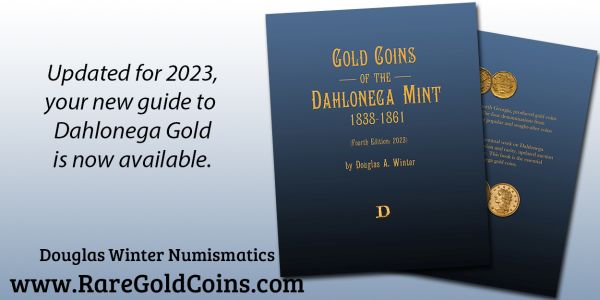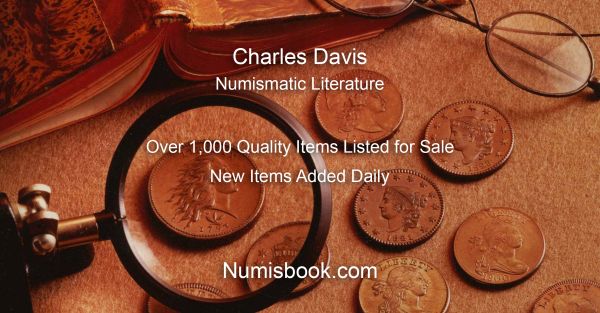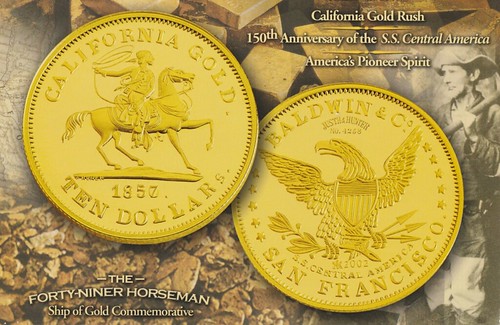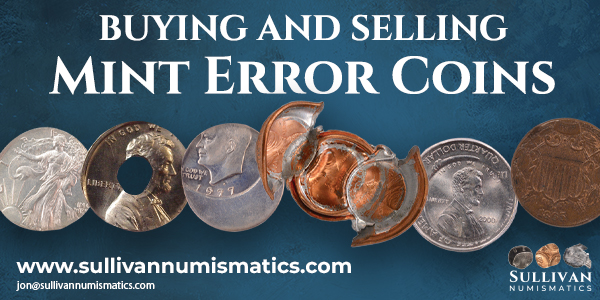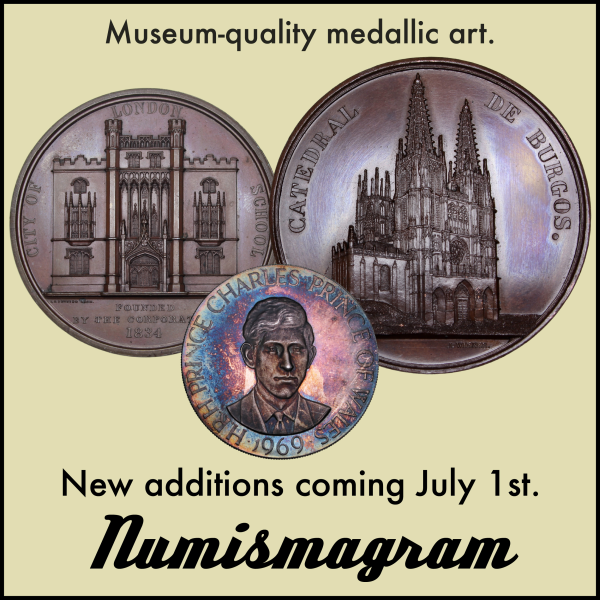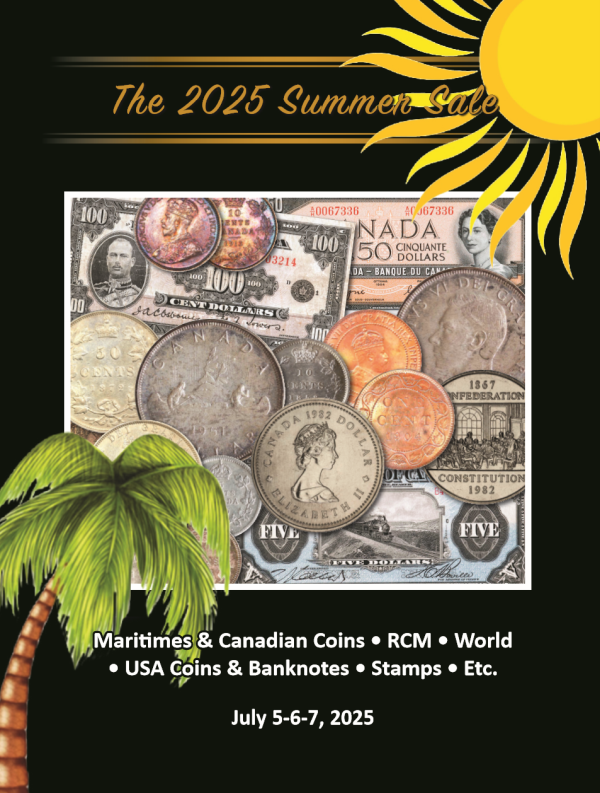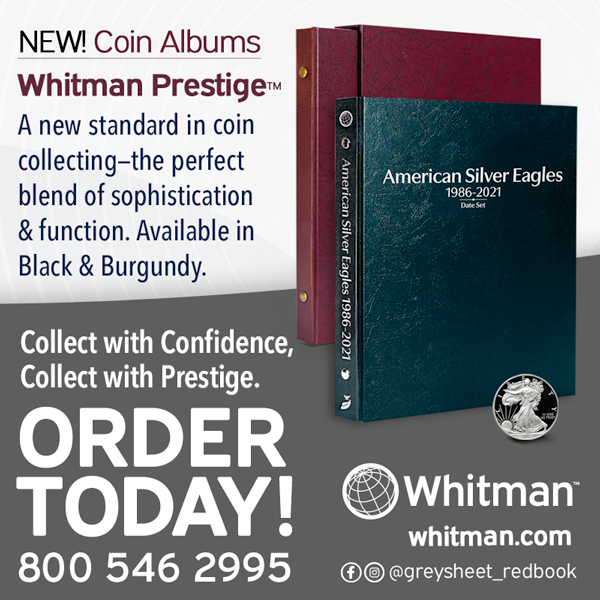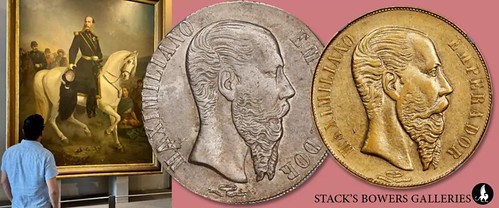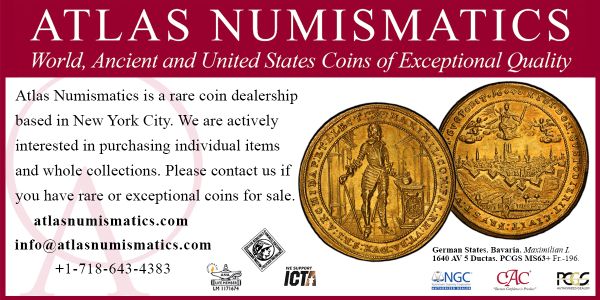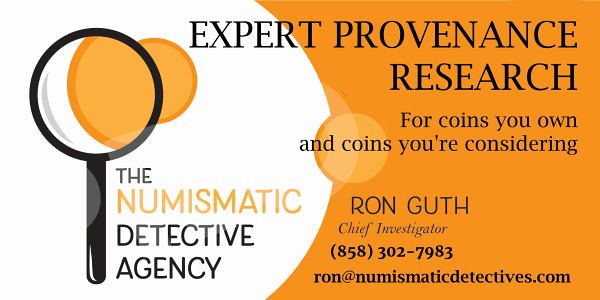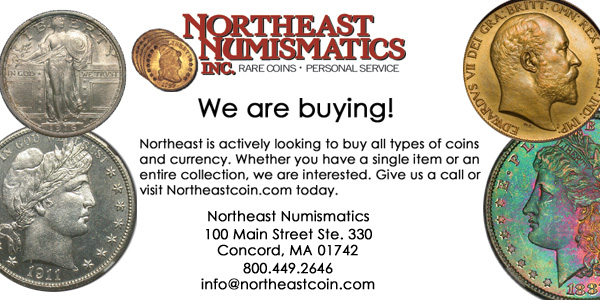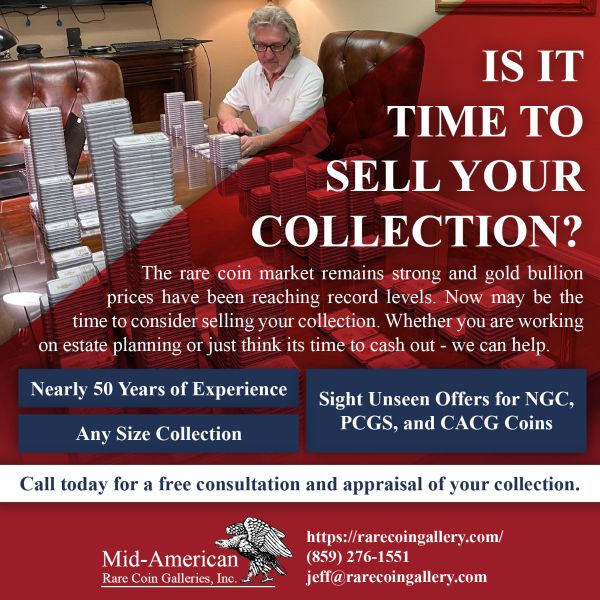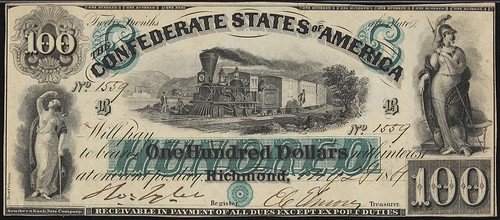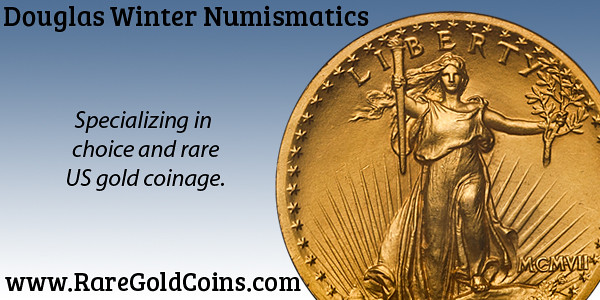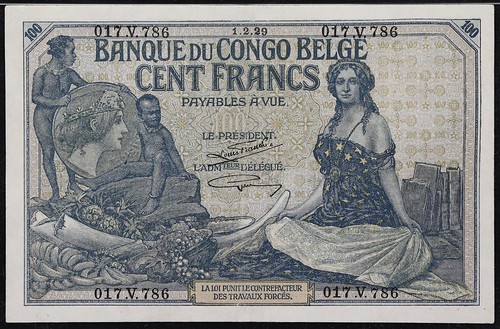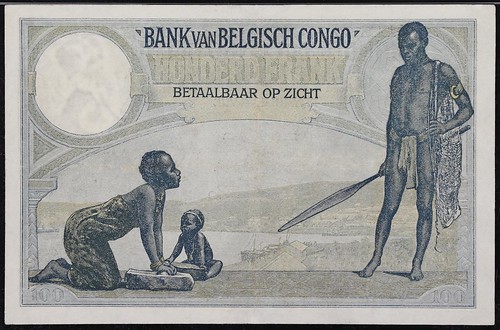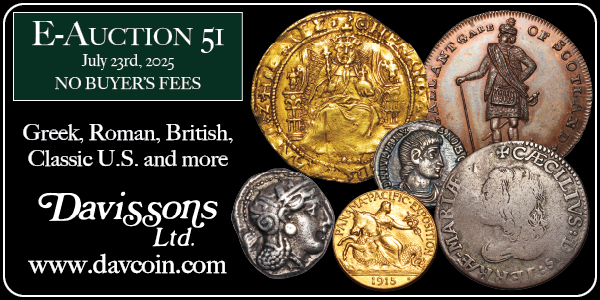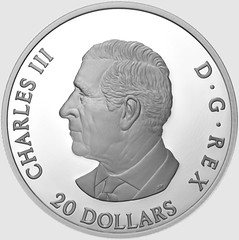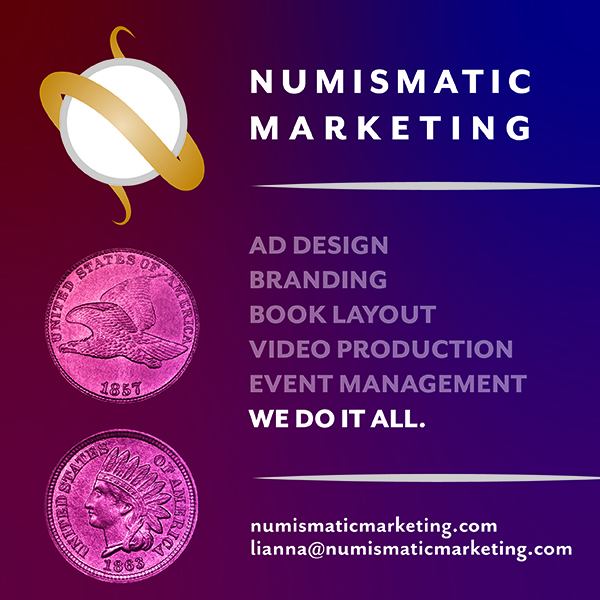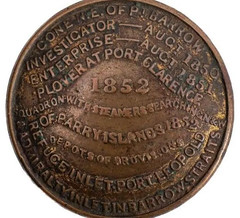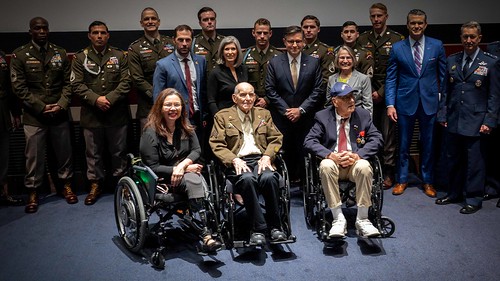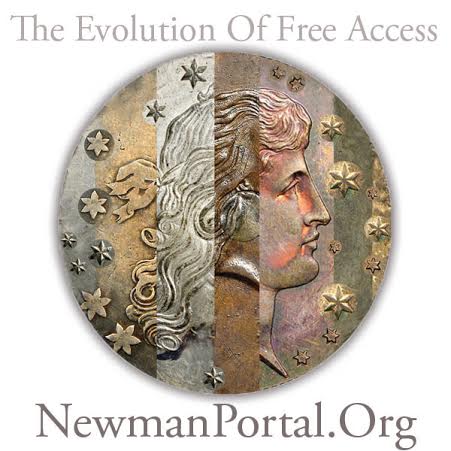
Visit our NBS Sponsors


About UsThe Numismatic Bibliomania Society is a non-profit association devoted to the study and enjoyment of numismatic literature. For more information please see our web site at coinbooks.org SubscriptionsThose wishing to become new E-Sylum subscribers (or wishing to Unsubscribe) can go to the following web page link MembershipThere is a membership application available on the web site Membership Application To join, print the application and return it with your check to the address printed on the application. Print/Digital membership is $40 to addresses in the U.S., and $60 elsewhere. A digital-only membership is available for $25. For those without web access, write to: Jeff Dickerson, Treasurer AsylumFor Asylum mailing address changes and other membership questions, contact Jeff at this email address: treasurer@coinbooks.org SubmissionsTo submit items for publication in The E-Sylum, write to the Editor at this address: whomren@gmail.com BUY THE BOOK BEFORE THE COINSale Calendar
|
- WAYNE'S WORDS: THE E-SYLUM JUNE 29, 2025
- NEW BOOK: AUSTRALIAN COIN & BANKNOTE VALUES
- NEW BOOK: UNITED STATES PAPER MONEY ERRORS
- NEW BOOK: DOCUMENTS OF THE HISPANIC CARIBBEAN, VOL 3
- 2025 IAPN BOOK PRIZES ANNOUNCED
- CAN YOU FIND THIS FRANKLIN MINT MEDAL?
- VIDEO: DEPRESSION SMALL SIZE PAPER MONEY
- MORE ON RON LANDIS
- MORE ON JAMES JARVIS
- NOTES FROM E-SYLUM READERS: JUNE 29, 2025
- VOCABULARY TERM: RIBBON DRAPE
- A COMMENTARY ON AWARDS
- EMPEROR MAXIMILIAN'S FINAL REQUEST
- HOW LARRY BRILLIANT BUILT THE INTERNET
- NUMI V3: AUTOMATED AI COIN SORTING PROTOTYPE
- 1907 UHR DOUBLE EAGLE AT OKLAHOMA ANA
- ATLAS NUMISMATICS SELECTIONS: JUNE 29, 2025
- STACK'S BOWERS: JULY 2025 CONFEDERATE CURRENCY SALE
- STACK'S BOWERS JULY 2025 WORLD PAPER MONEY SALE
- NUMISMATIC NUGGETS: JUNE 29, 2025
- CANADIAN MURANO MONARCH BUTTERFLY COIN
- CANADIAN MOON SKY RAVEN COIN
- 1852 FRANKLIN EXPEDITION RESCUE TOKEN
- WWII RANGERS GET CONGRESSIONAL GOLD MEDAL
- ON CONTINENTAL CURRENCY
- BUILDING THE BANK OF ENGLAND EXHIBIT
- LOOSE CHANGE: JUNE 29, 2025
- ABOUT THIS ISSUE: JUNE 29, 2025
Content presented in The E-Sylum is not necessarily researched or independently fact-checked, and views expressed do not necessarily represent those of the Numismatic Bibliomania Society.
WAYNE'S WORDS: THE E-SYLUM JUNE 29, 2025
 New subscribers this week include:
Ashley Wickens-Rumble, courtesy Steve Hill;
and Jared Goldfarb.
Welcome aboard! We now have 7,228 subscribers.
New subscribers this week include:
Ashley Wickens-Rumble, courtesy Steve Hill;
and Jared Goldfarb.
Welcome aboard! We now have 7,228 subscribers.
Thank you for reading The E-Sylum. If you enjoy it, please send me the email addresses of friends you think may enjoy it as well and I'll send them a subscription. Contact me at whomren@gmail.com anytime regarding your subscription, or questions, comments or suggestions about our content.
This week we open with three new books, the 2025 IAPN Book Prizes, updates from the Newman Numismatic Portal, notes and submissions from readers, and more.
Other topics this week include paper money errors, small sized paper money of the Great Depression, Ron Landis, James Jarvis, the 1907 Ultra High Relief Double Eagle, fixed price and auction selections, new Canadian coins, the Franklin Expedition rescue token, the Army Rangers Congressional Gold Medal, Continental Currency, and the Bank of England.
To learn more about Australian coins, Bianca Bart, numismatics of the Spanish Caribbean, Medieval Pennies, Canadian Decimal Coinage, Louisiana sculptor Angela Gregory, Emperor Maximilian's final request, an AI-powered coin identification app, the Complete Electronic Numismatic Trading Systems, the Dead Sea Scrolls of Online Numismatics, Confederate Currency, and the Case of the Bloody-Nosed Counterfeiter, read on. Have a great week, everyone!
Wayne Homren
Editor, The E-Sylum
NEW BOOK: AUSTRALIAN COIN & BANKNOTE VALUES
The new 2025 edition of Renniks' Australian Coin & Banknote Values is available for preorder. Here's information from the publisher's site. It's available in both soft and hardcover. -Garrett
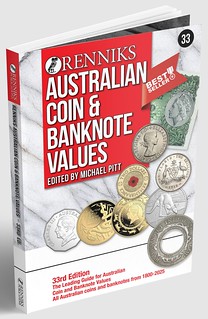 Renniks Australian Coin & Banknote Values 33rd Edition
Renniks Australian Coin & Banknote Values 33rd Edition
By: Michael Pitt
This comprehensive guide to Australian Coin & Banknote Values contains over 4,900 unique images and countless thousands of valuations. This book is a must for all collectors, whether you are just a beginning or an advanced collector. The latest information is compiled using weighted averages to assist pricing accuracy. Quality reproduction of photos makes it easy to identify items. Covered are copper, silver, gold, nickel, and all coins and notes used in Australia from 1800 to the present. Subjects include Pre-Decimal and Decimal currency and privately issued banknotes, war issues, and privately issued tokens. Also included are the latest Royal Australian Mint, Perth Mint & Australia Post Numismatic Covers.
NEW BOOK: UNITED STATES PAPER MONEY ERRORS
The new 5th Edition of Whitman's United States Paper Money Errors is available for preorder. Here's the Whitman Press release: -Garrett
 United States Paper Money Errors, 5th Edition
United States Paper Money Errors, 5th Edition
By: Dr. Frederick Bart and Bianca Bart
Whitman Brands is proud to unveil the long-awaited fifth edition of United States Paper Money Errors—a richly illustrated and fully revised guide to one of the most exciting areas of paper money collecting. Authored by the expert father-daughter team Dr. Fred Bart and Bianca Bart, this cornerstone title—originally published by the Coin & Currency Institute under the stewardship of Art Friedberg—has officially joined the Whitman family as the flagship title of its new Professional Series™.
"We're honored to continue the legacy of this essential book under the Whitman name," said John Feigenbaum, President and CEO of Whitman Brands. "As the market for paper money grows, especially in errors, this fifth edition couldn't come at a better time."
NEW BOOK: DOCUMENTS OF THE HISPANIC CARIBBEAN, VOL 3
Ángel Navarro Zayas has published a third volume of his book in Spanish compiling important numismatic documents relating to Puerto Rico, Cuba, and the Spanish Caribbean. Congratulations! It's available in print-on-demand on Lulu.com. Below is a Grammarly-translated description. -Editor
 All the documents in this documentary book, VOLUME III, belong to the National Historical Archive of Madrid. With this documentary collection, we have tried to emulate the efforts and honor the memory of great Puerto Ricans of the 19th century, such as Don Alejandro Tapia y Rivera, Don Román Baldorioty de Castro, Don José Julián de Acosta y Calbo, Don Ramón Emeterio Betances, and Don Segundo Ruiz Belvis, who together in 1851, formed the Society for the Collection of Historical Documents of the island of San Juan Bautista de Puerto Rico (Sociedad Recolectora de Documentos Históricos de la Isla de San Juan Bautista de Puerto Rico).
All the documents in this documentary book, VOLUME III, belong to the National Historical Archive of Madrid. With this documentary collection, we have tried to emulate the efforts and honor the memory of great Puerto Ricans of the 19th century, such as Don Alejandro Tapia y Rivera, Don Román Baldorioty de Castro, Don José Julián de Acosta y Calbo, Don Ramón Emeterio Betances, and Don Segundo Ruiz Belvis, who together in 1851, formed the Society for the Collection of Historical Documents of the island of San Juan Bautista de Puerto Rico (Sociedad Recolectora de Documentos Históricos de la Isla de San Juan Bautista de Puerto Rico).
That first significant effort made by these honorable men to transcribe primary sources in the archives in Spain about Puerto Rican history was the cornerstone of Puerto Rican historiography. That is why, in honor of these illustrious human beings and following the furrow of the path traced by them, I contribute my grain of sand with transcriptions of manuscripts, but in this case, on the subject of the use of currency in Puerto Rico and the economic aspect. The whole book is in Spanish.
Sobre cantidad a que asciende el situado que cobra la isla
El gobernador don Salvador Meléndez acompaña documentos de la Contaduría justificativos de la cantidad a que asciende el situado que cobra la isla y que no se ha modificado desde la R. O. de 27 de junio de 1784 (1811).
However, the first document to which we refer is from the beginning of the 19th century (1811), in which Governor-General Don Salvador Meléndez accompanies documents of the Accounting Office justifying the amount of the situado (Mexican Subsidy) charged by the island, which had not been modified since the Royal Order of June 27, 1784.
2025 IAPN BOOK PRIZES ANNOUNCED
The International Association of Professional Numismatists (IAPN) has announced the winners of their 2025 book prizes. Thanks, and congratulations to all the authors and publishers. -Editor
Peter Preston-Morley writes:
"I write to advise the result of the 2025 IAPN Book Prize, which was voted on by the members of the IAPN at our General Assembly in Madrid earlier today, 24 June.
"The winner is Jean-Yves Kind, since 2009 the Collections Manager for French coins at the Bibliothèque Nationale, Paris, for his important new 2-volume reference describing the French gold coins in the national collection. Second place went to Lucia Carbone, for her 2-volume work describing over 3,700 coins of the early Roman provinces from the collection of the late Rick Witschonke, now in the ANS in New York, and third place to Hugo Vanhoudt and John Saunders for their new priced catalogue of all the gold coins produced in the Low Countries and Dutch overseas territories since the beginning of numismatic time – over 23 centuries!
"The Prize will be presented to Jean-Yves at a numismatic event in Europe in the autumn, details to be finalised.
"This year there were 21 entries for the Prize."
CAN YOU FIND THIS FRANKLIN MINT MEDAL?
Newman Numismatic Portal Project Coordinator Len Augsburger has a request for our readers. -Editor
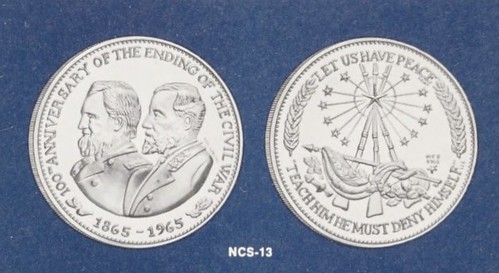
Civil War Centennial medal by Angela Gregory, from Numismatic Issues of the Franklin Mint (1970 edition)
Can You Find a Franklin Mint Medal?
This week the West Baton Rouge Museum in Port Allen, LA contacted us in search of a medal by the Louisiana sculptor Angela Gregory. Dick Johnson's Databank lists 14 medals for Gregory (1903-1990), including the 1972 ANA convention medal. The museum is currently developing an exhibit that will feature Gregory's work.
The elusive piece is Gregory's 1965 Civil War Centennial medal, engraved for Franklin Mint's National Commemorative Society series. This medal is no. 13 in the series, and an example resides in the American Numismatic Society (1965.338.1). Franklin Mint records indicate a production of three pieces in platinum and 5,249 examples in silver. No doubt many of these were melted in the 1970s as silver prices spiked toward the end of the decade. Can E-Sylum readers locate an example for sale?
VIDEO: DEPRESSION SMALL SIZE PAPER MONEY
The David Lisot Video Library on the Newman Numismatic Portal can be found at:
https://nnp.wustl.edu/library/multimediadetail/522852
We highlight one of his videos each week in The E-Sylum. Here's one from 2009 with Peter Huntoon speaking about the Small Size Paper Money of the Great Depression. -Editor
MORE ON RON LANDIS
1857 $10 Vaquero Reproduction
Cary Bown writes:
"Regarding the passing of Ron Landis and his dies for reproduction coins using gold recovered from the SS Central America, in addition to the mentioned 1855 Kellogg & Co. $50 reproduction, he also engraved the dies for the Baldwin 1857/0 $10 Vaquero struck by the Canadian mint and issued under the auspices of the California Historic Society."
MORE ON JAMES JARVIS
Last week Tony Terranova shared a 1776 one dollar New York note with the signature of Fugio cent coiner James Jarvis. -Editor
Ray Williams writes:
"About 10 years ago, Randy Clark made me aware of this signature on a note. I obtained one on eBay and another from John Kraljevich. I did some signature research and I'm convinced that this James Jarvis is the same one of CT Copper and Fugio Cent fame. Randy Clark has been keeping a census of notes appearing with his signature, and there's not a lot of them. There was one being auctioned in the past couple weeks, and I hope the owner appreciates it. By any chance, is this recent auction appearance the same note that Tony pictured in The E-Sylum?
"Hand signed notes are a big source of collecting fun for me as all Colonial and Continental Currency have them. Whether we know who the signer was or not... he was someone of importance at the time. And every note is indeed unique in that they have hand written serial numbers. I love this hobby!"
NOTES FROM E-SYLUM READERS: JUNE 29, 2025
German, not French
Thanks to John Regitko and Paul Hybert who spotted a mistake in the description of one of last week's Numismagram Medal Selections. Jeremy Bostwick agrees. The corrected sentence is below, and we'll update our article archive.
"Known in Dutch as the Nationale Maatschappij der Belgische Spoorwegen (NMBS) and in German as the Nationale Gesellschaft der Belgischen Eisenbahnen (SNCB), the National Railway Company of Belgium was formed in 1926 as a successor to the Belgian State Railways."
To read the earlier E-Sylum article, see:
Numismagram Medal Selections: June 22, 2025 : 103192 | BELGIUM. Art Deco bronze Medal
(https://www.coinbooks.org/v28/esylum_v28n25a15.html)
Other topics this week include the Drummer Boy Quarter Controversy, ANA Awards, and the Case of the Bloody-Nosed Counterfeiter. -Editor
VOCABULARY TERM: RIBBON DRAPE
Here's another entry from Dick Johnson's Encyclopedia of Coin and Medal Terminology. -Editor
Ribbon Drape. Folded and sewn ribbon from which a medal is suspended. Ribbon drapes add color, suspend a medal providing a means to wear it, and are attached to some means of fastening to a garment or uniform. The medal is usually looped by integral loop – made at the same time as the striking of the medal – or by a soldered loop, attached after it is struck and finished, or by a lug which is a part of the medal and is drilled to provide the opening for a ring.
A COMMENTARY ON AWARDS
E-Sylum Feature Writer and American Numismatic Biographies author Pete Smith submitted these comments on numismatic awards. -Editor
 For two weeks I was planning another article for the week, but that collapsed on Thursday
morning. I am falling back on a project I worked on earlier in the week.
For two weeks I was planning another article for the week, but that collapsed on Thursday
morning. I am falling back on a project I worked on earlier in the week.
In 1995, ANA President Ken Bressett appointed me chair of the ANA Awards Committee. I have maintained an interest over the years. I try to post the awards to the individual entries in American Numismatic Biographies.
Each year the ANA sends out a request for award nominations. Many of the awards are for service to the ANA. Often a retiring board member will get a Glenn Smedley Memorial Award, if nothing else.
EMPEROR MAXIMILIAN'S FINAL REQUEST
Stack's Bowers Numismatist & Lead Auctioneer Chris Ortega published a poignant article about the gold coins in Mexico Emperor Maximilian's final request. -Editor
Last month I walked through the halls of Chapultepec Castle in Mexico City. Portraits of Maximilian and his wife Carlota still hang in the rooms where they once lived. Standing there brought to mind two coins we are offering this August in our Summer Global Showcase Auction.
- MEXICO. 20 Pesos, 1866 Mo. Mexico City Mint. Maximilian I. NGC AU 55
- MEXICO. Peso, 1866 Pi. San Luis Potosí Mint. Maximilian I. NGC MS 61
Both coins were struck during Maximilian's brief reign in Mexico (1864 – 1867). Seeing where he once ruled, and understanding the history behind these coins, gives a deeper appreciation for them.
HOW LARRY BRILLIANT BUILT THE INTERNET
This week BBC published an article headlined "How the Grateful Dead built the internet". Here's an excerpt, and yes, there's a numismatic connection: my old boss Dr. Larry Brilliant, who developed a computer-based network for coin collectors before pivoting to apply the software in co-founding The Well, which became the online hangout for Deadheads and countless internet pioneers. Following the BBC excerpt are excerpts from earlier E-Sylum articles about Larry's Complete Electronic Numismatic Trading Systems (CENTS). -Editor
Before the internet took over the world, psychedelic rock band The Grateful Dead were among the first – and most influential – forces at the dawn of online communication.
[T]he Dead shaped far more than rock, psychedelia and '60s drug culture. Thanks to a group of music-loving tech enthusiasts, the Dead popularised what some call the first real online community. Generations later, the ideas formed in this pioneering digital space still reverberate through our daily lives.
Fans of the Dead, known as "Deadheads", were inspired by the band's embrace of all things technological, from their pioneering sound systems to their immersive multimedia visuals. Many fans were technologists and engineers themselves, working in Silicon Valley or at universities around America with access to early internet technology – which they were using by the late 1970s to swap hot commodities like Grateful Dead setlists and illegal drugs.
In the 1980s, years before the World Wide Web, a virtual online community emerged called the Well (the Whole Earth 'Lectronic Link). Centered on the San Francisco Bay Area of California, the Well not only thrived in its own right, but proved to be one of the most influential factors in the birth of the internet as we know it today. And its long life was in large part thanks to fans of the Grateful Dead.
NUMI V3: AUTOMATED AI COIN SORTING PROTOTYPE
So what are people using computers for in numismatics these days? Here's one foray into artificial intelligence. Justin Hinh submitted this update on his AI-powered coin identification app. Thank you! -Editor
Numi v3: Automated AI Coin Sorting Prototype
Last summer, I shared my journey of building an AI-powered coin sorting robot, Numi v2. After several months of development, I paused the project because AI technology wasn't quite ready. However, by March, AI advancements convinced me it was time to pick it back up.
The past two months have been an intense sprint to complete Numi v3, just in time for the Colorado Springs Coin Club Show and the ANA Summer Seminar. I'm thrilled to announce that after hundreds of hours of work, Numi v3 is ready for its public prototype debut!
I'll be demoing Numi at:
- Colorado Springs Coin Club Show [June 27th–28th]
- ANA Summer Seminar [June 28th–July 3rd]
If you can't attend, check out this video demo!
1907 UHR DOUBLE EAGLE AT OKLAHOMA ANA
The 1907 Ultra High Relief Double Eagle from the Saint-Gaudens' Estate will be displayed as part of the Tyrant Collection at the 2025 ANA World's Fair of Money. This will be only the third public appearance of this historic numismatic rarity since it sold a decade ago for $2,115,000. -Garrett
The 1907 Ultra High Relief Double Eagle, designed by acclaimed sculptor Augustus Saint-Gaudens and later presented to his widow on behalf of President Theodore Roosevelt, will be displayed at the American Numismatic Association 2025 Oklahoma City World's Fair of Money® (www.WorldsFairofMoney.com).
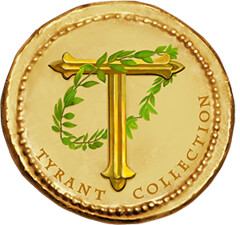 On loan courtesy of California collector Dan O'Dowd, owner of the legendary Tyrant Collection (www.TheTyrantCollection.com), this historic, famous coin is graded PCGS Proof 68 and will be a highlight in the ANA's Museum Showcase exhibits at the convention, August 19-23.
On loan courtesy of California collector Dan O'Dowd, owner of the legendary Tyrant Collection (www.TheTyrantCollection.com), this historic, famous coin is graded PCGS Proof 68 and will be a highlight in the ANA's Museum Showcase exhibits at the convention, August 19-23.
Described by many experts as America's most beautiful coin design, O'Dowd acquired the famous $20 denomination gold piece for $2,115,000 in 2015. It is now insured for $5 million, and this will be only the third time it has been publicly displayed in a decade.
"I am excited about this coin," stated O'Dowd.
"It is not only the most beautiful coin America has ever produced, but it also rivals anything created by any other country. Saint-Gaudens admired ancient Greek style and wanted to create something America would be proud of after President Roosevelt asked him to help redesign early 20th-century U.S. coinage," explained O'Dowd.
The coin has inverted edge lettering of the motto E PLURIBUS UNUM and the designer's initials, ASG.
ATLAS NUMISMATICS SELECTIONS: JUNE 29, 2025
Atlas Numismatics has updated their website with 285 new coins, medals, and tokens at fixed prices. Select items are discussed below. -Garrett
1082842 | GREEK. PTOLEMAIC KINGS OF EGYPT. Ptolemy III (posthumously struck under Ptolemy IV). (Pharaoh, 246-222 BC). Struck posthumously under Ptolemy IV, 219-217 BC. AV Mnaieion or Octodrachm. NGC Ch. AU (Choice About Uncirculated) Strike 5/5 Surface 4/5 Fine Style. Alexandria. 26mm. 27.79gm. Bust of deified Ptolemy III right, wearing radiate diadem and aegis, ornate trident over left shoulder, the central tine ornamented with lotus finial; dotted border / ?TO?EMAIOY-BASI?EOS// ?I below, dotted border. Cornucopia bound with radiate royal diadem, containing grain ear, pyramidal cake, and pomegranate, grape cluster hanging from left side of rim. CPE 888 (same obverse die); Svoronos 1117.
Ex Heritage Auctions, Auction 3037 (5 January 2015) Lot 30940.
$44,500
To read the complete item description, see:
Posthumous Octodrachm of Ptolemy III
(https://atlasnumismatics.com/1082842/)
STACK'S BOWERS: JULY 2025 CONFEDERATE CURRENCY SALE
Stack's Bowers will be hosting their The July 2025 Confederate Currency Auction on July 17. Select items are discussed below. -Garrett
T-5. Confederate Currency. 1861 $100. PMG Very Fine 30. No. 1559. Plate B. A product of the Southern Bank Note Company out of New Orleans. This evenly circulated and rather original T-5 $100 is a particularly eye appealing sight and features no endorsements on the verso. Estimate: $1,250 - $1,750.
STACK'S BOWERS JULY 2025 WORLD PAPER MONEY SALE
Stack's Bowers will be hosting their The Mid-Year 2025 World Paper Money Auction on July 8-10. Select items are discussed below. -Garrett
BELGIAN CONGO. Banque du Congo Belge. 100 Francs, 1.2.1929. P-11f. PMG Very Fine 30. Without place of issue. While we are no stranger to rare Belgian Congo notes, we have only offered this variety twice before, with this being the finest example offered by us to date, despite some minor restoration that, if anything, has only helped improve the appearance of this piece. Equal in appearance, if not better, than the piece from the Scott Lindquist collection, which we sold in May of 2023 for $16,800 (that piece was graded PMG Very Fine 25 with a 'stained' comment). We will keep our estimate for the present piece at a modest level, but don't be surprised if a similar figure is needed to bring this rarity home. PMG Comments "Minor Restoration". Estimate: $5,000 - $10,000.
To read the complete item description, see:
BELGIAN CONGO. Banque du Congo Belge. 100 Francs, 1.2.1929. P-11f. PMG Very Fine 30.
(https://auctions.stacksbowers.com/lots/view/3-1K02TU/belgian-congo-banque-du-congo-belge-100-francs-121929-p-11f-pmg-very-fine-30)
NUMISMATIC NUGGETS: JUNE 29, 2025
It's been a while since I've pulled together one of these articles. Here's a selection of interesting or unusual items I came across in the marketplace this week. Tell us what you think of some of these. -Editor
Prints of 1970 Menconi Ohio's Aerospace Pioneers Medal
After Ralph J. Menconi (American, 1915-1972)
Ohio's Aerospace Pioneers, 1970
Photographic print on paper mounted on board
Signed in plate to lower edge of one
Not an actual medal, but a neat design. -Editor
To read the complete lot description, see:
Prints After Ralph Menconi "Ohio's Aerospace Pioneers" Bronze Medal, 1970
(https://www.ebth.com/items/14162964-prints-after-ralph-menconi-ohio-s-aerospace-pioneers-bronze-medal-1970)
Other topics this week include an 1980 Russian Olympics plaque, a Philippines Anting-Anting medal, and a book on Platinum Coinage. -Editor
THE BOOK BAZARRE
CANADIAN MURANO MONARCH BUTTERFLY COIN
Campbell River, British Columbia, Canada artist Caren Heine designed artwork for the Royal Canadian Mint's Murano Monarch Butterfly half-kilo silver Coin, depicting a handcrafted monarch butterfly in Murano glass. -Garrett
CANADIAN MOON SKY RAVEN COIN
The Royal Canadian Mint released its Moon Sky: Raven — 1 oz. Fine Silver Coin, which features a holographic depiction of a raven, a key figure in many Intuit legends. -Garrett
If you loved anything holographic when you were a kid, Canada's new coin will certainly have you mesmerized.
The Royal Canadian Mint released the Moon Sky: Raven — 1 oz. Fine Silver Coin that showcases the Raven, which plays a central role in many Inuit legends. It's the Mint's only holographic coin in 2025.
The holographic effect was created by striking 3D embossing micro-textures into the coin's surface during the minting process. According to the Crown corporation, the colours on the hologram may appear iridescent, shifting between hues like blue, green, yellow, or red, depending on the lighting and the angle from which it's viewed.
1852 FRANKLIN EXPEDITION RESCUE TOKEN
A rare button token from a 19th century Arctic expedition rescue effort has recently sold. -Editor
A rare Arctic rescue button was sold at auction on Tuesday for £6,000, which was 10 times its pre-sale estimate.
Auctioneer Brian Goodison-Blanks, of Bearnes, Hampton and Littlewood in Exeter, said only three other examples of this type of button were known to exist in the Smithsonian Institute and private collections.
The Arctic rescue button was part of a 19th Century expedition.
The rare piece of Arctic and Naval history attracted international interest in the specialist maritime sale.
WWII RANGERS GET CONGRESSIONAL GOLD MEDAL
As CBS News put it, "a rare exhibition of congressional bipartisanship took place in the Capitol's Emancipation Hall, when two Army Ranger veterans, ages 100 and 99, were awarded Congressional Gold Medals." -Editor
More than 80 years after they took part in D-Day, the largest naval, air and land operation in history, members of the all-volunteer World War II Ranger battalions were honored with the Congressional Gold Medal.
"They were America's best," Speaker of the House of Representatives Mike Johnson said during a June 26 ceremony on Capitol Hill as two World War II Rangers listened in person and three more tuned in virtually. "The Rangers led the way as America and the Allied Powers clawed back the continent of Europe, and in their courage, all Americans found something to be proud of, and the free world found a reason to hope."
The June 6, 1944, D-Day invasion saw over 150,000 Allied troops land on the beaches of Normandy, France, and it was a key turning point that enabled France's liberation from Nazi control and the eventual defeat of Germany in the spring of 1945. Over 9,000 Allied troops were killed or wounded, according to an Army webpage.
ON CONTINENTAL CURRENCY
Jim Haas submitted these notes on Continental Currency. Thanks. -Editor
Here is a discovery that I thought would interest readers. By way of background, Peter Schreiner, 1853-1937, was born into one of College Point's oldest and reputable families. He became an architect and builder and built many of the buildings in the community, some that still stand today.
While many readers may know about the history of paper money in America, I admit to being totally unaware that such a thing as a four dollar bill had ever existed, I did some research and learned much. The four-dollar bill was issued by the Continental congress between 1775 and 1779 along with bills in denominations of one, two three, five, six, seven, eight and twenty dollars. The basis of this money was in Spanish milled dollars and two million dollars were issued in 1775.
BUILDING THE BANK OF ENGLAND EXHIBIT
In their July Newsletter, the Bank of England museum announced an upcoming exhibit. -Editor
13 June marked the birthday of Bank architect Herbert Baker, and we celebrated it in the best way we could think of - by announcing a new exhibition!
Opening 16 September 2025, our brand new exhibition Building the Bank will uncover the dramatic transformation of the Bank of England's iconic Threadneedle Street site.
In the lead-up to the exhibition, there'll be a whole host of events to get involved in, including:
- Curator-led talks exploring Baker's vision and legacy
- Architecture walking tours tracing 300 years of Bank history
LOOSE CHANGE: JUNE 29, 2025
Here are some additional items in the media this week that may be of interest. -Editor
Jeff Garrett published an article for NGC on the American Gold Eagles. Here's an excerpt - see the complete article online. -Editor
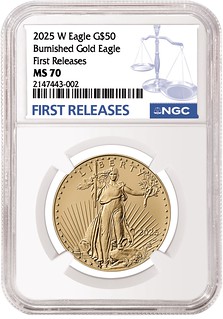 Next year will be the 40th anniversary of the American Gold and Silver Eagles. This anniversary is sure to draw considerable attention to an already-popular segment of the hobby. The US Mint will most certainly be issuing special coins to celebrate the milestone, as well. NGC will offer a host of special labels for the 40th anniversary, similar to what they have done in the past.
Next year will be the 40th anniversary of the American Gold and Silver Eagles. This anniversary is sure to draw considerable attention to an already-popular segment of the hobby. The US Mint will most certainly be issuing special coins to celebrate the milestone, as well. NGC will offer a host of special labels for the 40th anniversary, similar to what they have done in the past.
A set of American Silver Eagles is affordable and can be completed with a modest cash outlay. Silver Eagles have been produced since 1986, with coins struck in Uncirculated and Proof. The mint has also sold several special finish coins for collectors, including Reverse Proof and Enhanced Uncirculated. A more recent innovation has been coins with special privy marks, such as the ones struck to commemorate the 250th anniversary of the US Army. Upon their release last week, the coins quickly sold out.
The American Silver Eagles contain one ounce of pure silver and have an impressive physical appearance. With silver bullion selling for around $36 per ounce, the issues are attractive for collectors of limited means.
These contrast sharply with the American Gold Eagles series. These coins range in size, and are produced in weights of 1/10 ounce, 1/4 ounce, 1/2 ounce and 1 ounce. The Mint began producing these in 1986, in accordance with the Gold Bullion Coin Act of 1985. The coins are guaranteed by the US government to contain the stated amount of gold and are required to contain gold sourced in America.
The obverse features a modern rendition of the Augustus Saint-Gaudens Double Eagle design that was first used in 1907. Coins struck from 1986 to 1991 are dated with Roman numerals. In 1992, the Mint switched to Arabic numerals. The reverse design of a family of eagles was created by Miley Frost and features a male eagle carrying an olive branch above a nest with a female eagle and hatchlings. In 2021, the reverse was updated to feature a close-up portrait of an eagle. The new design was created by Jennie Norris. These bullion coins are legal tender and carry face values of $5, $10, $25 and $50.
To read the complete article, see:
Jeff Garrett: American Gold Eagles
(https://www.ngccoin.com/news/article/14200/)
Other topics this week include the cashless nature of the Chinese economy. -Editor
ABOUT THIS ISSUE: JUNE 29, 2025
One of the more frustrating (but ultimately rewarding) episodes this week was the time I spent online and on the phone working to finalize my flights for this summer's ANA convention. Lord willing and the creek don't rise, I should make it there in plenty of time to attend. I've also started mapping out my schedule. It's always tough to fit in everything one wants, but I hope to relax and enjoy the moment with my numismatic friends in between mad dashes from one event to the next.
Pulling the thread. Three articles this week resulted from what I call "pulling the thread" on a story from a "toehold" into a full article. I'd come across a news story about a local WWII vet receiving the Congressional Medal of Honor. Poking around online I found several stories about the ceremony at the U.S. Capitol. I picked what seemed to have the best writeup and excerpted it. Then I went to the other articles I'd found and added images to better tell the story. I succeeded in my #1 goal of locating at least one image of an actual gold medal that was presented.
Another article grew from a reference in an Antiques Trade Gazette email. It pictured a recently sold 1852 Franklin expedition rescue token. I don't have a subscription to the publication and couldn't reach the details. But auction houses issue press releases to get such coverage, and I felt sure I should be able to find more information elsewhere, and I did.
The third example was an AbeBooks alert that listed the book on platinum coins and medals. The listing did not include a cover image, but a web search turned one up elsewhere. I pieced together the book information that you see in this issue.
Artificial intelligence will affect nearly everything, including numismatics. I came across this article describing who scientists are archiving pre-2022 sources untouched by ChatGPT and AI contamination.
Perhaps the E-Sylum and Newman Numismatic Portal archives will make their way there.
Scientists once hoarded pre-nuclear steel; now we're hoarding pre-AI content
(https://arstechnica.com/ai/2025/06/why-one-man-is-archiving-human-made-content-from-before-the-ai-explosion/)
Finally, I wanted to mention this Newman Numismatic Portal ad I ran across. It's from 2016. I miss these - they were part of a campaign to raise awareness of NNP following its launch. It's come a long way, baby! -Editor

